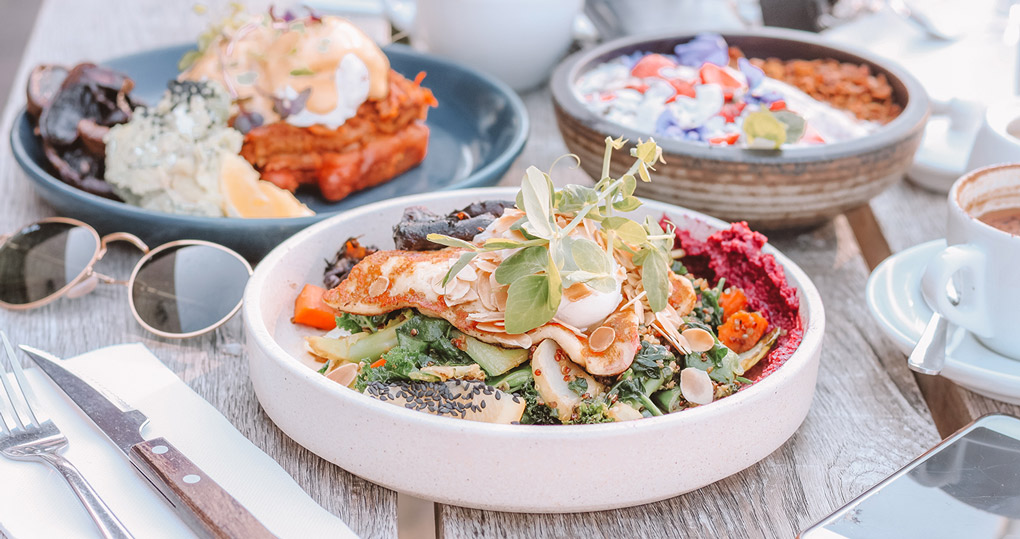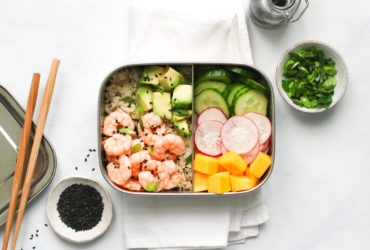If you’re looking forward to your beach holiday, but you’re struggling with uncomfortable bloating symptoms, then follow these 8 simple tips to de-bloat before having fun in the sun:
1. Try taking a probiotic supplement
Having an imbalance of good and bad bacteria in the gut may be associated with various digestive health conditions such as bloating and supplementing with probiotics may reduce symptoms. One study which provided 214 patients who had IBS with a probiotic, showed improvements in symptoms such as pain and bloating in 78% of patients.[1] Specific strains of bacteria which have been specifically studied to reduce bloating include Bifidobacterium infantis 3524. [2]
2. Consider peppermint oil
Peppermint oil comes from the stems, leaves and flowers of the plant. This oil has been shown to reduce IBS symptoms including bloating. It’s thought that menthol may be the active component and works by dulling pain receptors in the stomach and relaxing the muscles in the colon which can relieve gas and bloating.
Peppermint oil can interact with some health conditions as well as medication, therefore it’s important to seek guidance from your health care provider before taking.
3. Strengthen your core
The current guidelines for strength training are to carry out two sessions per week. Why not use those sessions to strengthen your core. Training the core can help to keep the stomach tone, strong and flat.

4. Eat mindfully
The first step to manage bloating is to assess the way you’re eating. Mindful eating can be a great first step for helping to improve digestive health. Focus on chewing thoroughly, eat slowly and eat away from distractions such as your laptop, TV and phone. By eating mindfully you can help with optimal digestion and may minimise the occurrence of bloating.
Try
- Eating more slowly – put your knife and fork down between each bite, savour the flavours and allow your brain time to register your fullness cues.
- Chew! – try choosing 15-30 times, notice the flavours & textures of your food.
- Eat without distraction – many people mindlessly eat in front of their TV, laptop or phone without registering the flavours and whether they’re full or not. Focus on your food and I promise you will experience your meal more intensely – especially the pleasure of it, leaving you more satisfied.
5. Keep Moving
Focus on minimising constipation by consuming enough fibre within the diet and taking regular exercise. Research suggests that a 20-30 minute brisk walk several times a week can help to stimulate peristalsis within the gut, move gas along the digestive tract and improve bowel function.
6. Watch out for dietary triggers
Certain foods and drinks can trigger bloating for some. For example, many people turn to protein bars and diet foods pre-holiday which tend to include sweeteners such as sorbitol or additional fructose which can trigger bloating and gas for many.
7. Considered a Low FODMAP Diet
FODMAP is an acronym which stands for specific types of carbohydrate molecules which some people with IBS struggle to digest and may trigger bloating and gas. There is good research to suggest that following this diet can improve symptoms for as many as 74% of people with IBS. However as this diet is complex, it should only be considered upon guidance from a dietician or nutritionist.
8. Consider digestive enzymes
Digestive enzymes such as lactase supplementation may aid with digesting lactose found in milk. Whilst alpha-galactosidase may aid with digesting tricky fibres found in beans and lentils which may cause gas.
If you struggle with food intolerance such a lactose intolerance, digestive enzymes may be of support in reducing symptoms.
Lily is a London Nutritionist who graduated from Newcastle University with a BSc (Hons) degree in Food and Human Nutrition (AfN accredited) where she was awarded the Sage Faculty for Excellence Scholarship on an annual basis. She then went on to complete a 2-year post graduate Diploma in Nutritional Therapy and is currently working towards her MSc in Nutritional Medicine (AfN accredited) at the University of Surrey. Lily’s extensive knowledge of the science of food and health, enables her to regularly write for The Times, The Telegraph, The Daily Mail, The Independent, Women’s Health and Cosmopolitan.
Her frequent TV appearances include ITV’s This Morning with Holly Willoughby and Phillip Schofield, and ITV’s primetime series Save Money: Lose Weight with Dr Ranj Singh. Lily’s passion is to simplify the science around nutrition, to provide health hacks and smarter eating strategies to empower people to enjoy a healthy and successful lifestyle. Her specialities lie in workplace wellness, implementing nutrition focused wellbeing programmes within corporate organisations across the UK.
Lily also sees individual clients from her clinic in Chelsea and a private medical practice based in Notting Hill.



